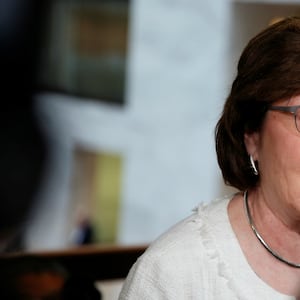A draft opinion obtained by Politico shows that the conservative majority of the Supreme Court is moving toward striking down Roe v. Wade, the landmark 1973 Supreme Court decision that established the legal right to an abortion.
“Roe was egregiously wrong from the start,” Justice Samuel Alito writes in the 98-page draft labeled “Opinion of the Court.”
“We hold that Roe and Casey must be overruled,” Alito continues. “It is time to heed the Constitution and return the issue of abortion to the people’s elected representatives.”
While Politico is careful to note this is simply a draft decision—the Supreme Court isn’t expected to decide abortion rights for another couple of months—the decision as currently written is a full repudiation of abortion rights. It would rule that Mississippi has the right to ban abortion after 15 weeks.
But the draft decision itself goes far beyond just upholding the Mississippi law; it would completely overturn the most essential abortion rights established in Roe and later affirmed in Planned Parenthood v. Casey.
The draft decision says “the right to abortion” does not fall within the rights to liberty, and if affirmed by the court, it would immediately throw the nation’s abortion laws into chaos.
There are already 13 states that have so-called trigger laws that would automatically ban abortion once the Supreme Court strikes down Roe: Arkansas, Idaho, Kentucky, Louisiana, Mississippi, Missouri, North Dakota, Oklahoma, South Dakota, Tennessee, Texas, Utah, and Wyoming.
On top of those 13, many other GOP-controlled states are likely to introduce new restrictions to abortion—if not completely outlaw the practice.
South Dakota Gov. Kristi Noem tweeted late Monday that if the court overturns Roe v. Wade, she “will immediately call for a special session to save lives and guarantee that every unborn child has a right to life in South Dakota.”
The draft decision rails against abortion in no uncertain terms.
“The inescapable conclusion is that a right to abortion is not deeply rooted in the Nation’s history and traditions,” Alito writes in the draft. “On the contrary, an unbroken tradition of prohibiting abortion on pain of criminal punishment persisted from the earliest days of the common law until 1973.”
“We do not pretend to know how our political system or society will respond to today’s decision overruling Roe and Casey,” the decision goes on to say. “And even if we could foresee what will happen, we would have no authority to let that knowledge influence our decision. We can only do our job, which is to interpret the law, apply longstanding principles of stare decisis, and decide this case accordingly. We therefore hold that the Constitution does not confer a right to abortion. Roe and Casey must be overruled, and the authority to regulate abortion must be returned to the people and their elected representatives.”
The leaking of the decision—itself a newsworthy and unprecedented action for the notoriously secretive Supreme Court—is sure to have an immediate effect in Washington. Democrats have long argued for national laws protecting abortion rights. Republicans have long argued that states should be free to make their own laws, mostly hoping states would ban or greatly restrict the practice.
But one thing seemed clear Monday night: Whoever leaked the draft decision intended to influence the private deliberations.
As the Supreme Court continues to consider the draft opinion, its mere existence has instantly thrown what was once reflexively referred to as “settled law” into an open question.
Among the five justices who appear to have signed on to the draft decision—Alito, Clarence Thomas, Neil Gorsuch, Brett Kavanaugh, and Amy Coney Barrett—all five were appointed by Republicans. Three were appointed by Donald Trump.
Chief Justice John Roberts, who was appointed by Republican George W. Bush, had not signed on to the initial draft decision, but as Politico notes, he may ultimately side with the majority. Sources told CNN that Roberts was willing to uphold the Mississippi law before the court, but he was not willing to completely overturn Roe, lending further credibility to the draft opinion.
While the veracity of the draft was the major immediate question, the political fallout of the impending decision, as well as what lawmakers could do to protect abortion rights, may loom even larger.
A number of GOP lawmakers who claim to support abortion rights voted for Trump’s Supreme Court picks seemingly under the assumption that those justices would not strike down abortion.
Sen. Susan Collins (R-ME) famously said she would not support a nominee who demonstrated “hostility” toward Roe, let alone outright opposition.
But Collins voted for Gorsuch, who got his seat after Republicans went “nuclear” in the Senate to allow Supreme Court nominees to only garner a simple majority. And she voted for Kavanaugh, who faced allegations of sexual assault.
Although it was too early Monday night to know exactly what effect the draft decision would have on the midterm elections, a 6-3 Republican-appointed Supreme Court overturning Roe could upend conventional wisdom about the strong advantage the GOP holds in the November elections.
Even more concerning for the GOP’s political prospects, if the draft decision does become real in the coming months, Republicans could face a significant backlash from voters who believed the right to an abortion was, in fact, settled. And while some Republicans may want to join Democrats in passing legislation to protect the right to an abortion, any such bill would face stiff opposition in the Senate, where there is still a 60-vote threshold for passage.
The House passed a bill in September—called the Women’s Health Protection Act—that would have codified Roe into national law. But the legislation failed to pass in the Senate. Sen. Bernie Sanders (I-VT) and Sen. Tammy Baldwin (D-WI) tweeted Monday that the Senate should pass the bill—and eliminate the filibuster if it could not garner the requisite 60 votes.
Meanwhile, Alexis McGill Johnson, the president of Planned Parenthood, tweeted that the organization had been “preparing for every possible outcome in this case.”
“Our health centers remain open and make no mistake, we’re fighting like hell,” she said.
Renee Bracey Sherman, a prominent activist and the founder the pro-abortion nonprofit We Testify, told The Daily Beast on Monday night that abortion remains legal in all 50 states as of now, but this emergency was “for real.”
“This is not a drill,” she said. “And we need Congress to show up. We need the president to show up. We have been warning about this for a decade and they have treated us like fucking Chicken Little.”








